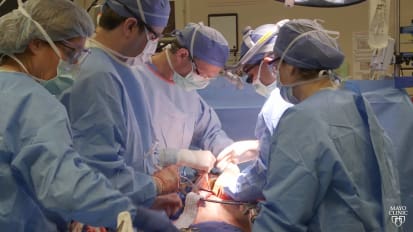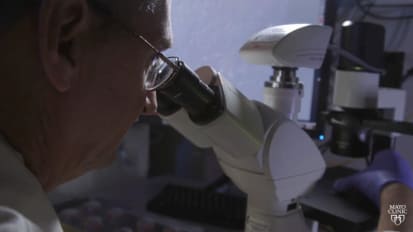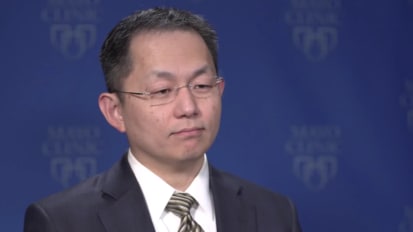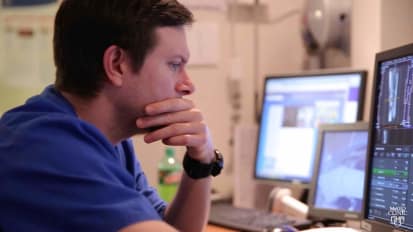Latest Videos |view all videos

A multidisciplinary approach to genitourinary cancers
Mayo Clinic specialists describe considerations and advancements in surgical techniques used in the treatment of testicular cancer, bladder cancer and kidney cancer.

Cancer care at Mayo Clinic's campus in Arizona
Mayo Clinic experts in Arizona discuss the new facility, which allows them to create a seamless experience for patients by integrating all cancer services from prevention to survivorship.

Brain & central nervous system cancers: Personalized care for each patient
Mayo Clinic's multidisciplinary team of experts discusses developments in diagnostic tools, imaging, neurosurgery, and radiation therapy that allow them to create personalized care plans for people with brain and central nervous system cancers.

Unlocking the power of gene expression: Molecular classification of brain tumors
Mayo Clinic physicians and researchers discuss how the molecular makeup of brain tumors can be used to identify five categories of gliomas, each with different clinical features and outcomes.

HDAC inhibitors and their role in treating anaplastic thyroid carcinoma
In their bid to find the best combination of therapies to treat anaplastic thyroid cancer, John A. Copland III, Ph.D., and a team of researchers at Mayo Clinic's campus in Florida demonstrated that all histone deacetylase (HDAC) inhibitors ...

Genes of colon cancer recurrence differ among blacks, whites and Asians
The genetic makeup of colon cancer tumors and survival rates for people with the disease differ by race, according to a study from researchers at the Mayo Clinic Cancer Center.

Prior oral contraceptive use associated with better outcomes for patients with ovarian cancer
Patients who develop ovarian cancer appear to have better outcomes if they have a history of oral contraceptive use, according to a study by Mayo Clinic researchers published in the current issue of the journal BMC Cancer.

Protective mastectomies that preserve nipple safe for women at high breast cancer risk
Preventive mastectomies that preserve the nipple and surrounding skin are as safe as more-invasive surgeries for women who carry the genetic mutation BRCA, a study led by Mayo Clinic has found. The BRCA mutation raises the risk of developing breast cancer

Researchers identify best drug therapy for rare, aggressive pancreatic cancer
Each year, about 200 to 400 Americans develop acinar cell carcinoma, a rare form of pancreatic cancer that has no effective standard of care.

Radiation therapy associated with a lower risk of recurrence in people with pancreatic cancer
Radiation therapy improves survival times in patients who are candidates for pancreatic cancer surgery.

FISH helps identify biliary tract malignancies
Michael J. Levy, M.D., a consultant in Gastroenterology and Hepatology at Mayo Clinic's campus in Rochester, Minnesota, discusses clinical utility, optimum specimen collection methods.
